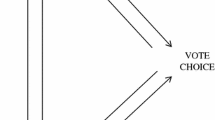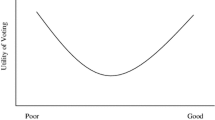Abstract
Several recent papers in the public choice literaturesuggest that legislators shirk, or vote in a mannercontrary to constituent interest. This paper exploresthe relationship between senatorial shirking andelectoral consequences. I model political shirking,opponent quality and election outcomes assimultaneous, and find significant evidence of arelationship between shirking over the senatorial termand electoral outcomes. However, I find that voterspunish recent shirking much more than they punishearly-term shirking, and that senators apparently actconsistently with this relationship.
Similar content being viewed by others
References
Amacher, R. and Boyes, W. (1978). Cycles in senatorial voting behavior: Implications for the optimal frequency of election. Public Choice 33: 5–14.
Amacher, R. and Boyes, W. (1979). Politicians and polity: Responsiveness in American government. Southern Economic Journal 46: 558–567.
Bender, B. (1994). A reexamination of the principal- agent relationship in politics. Journal of Public Economics 53: 149–163.
Besley, T. and Case, A. (1995). Does electoral accountability affect economic policy choices?: Evidence from gubernatorial term limits. Quarterly Journal of Economics 110: 769–798.
Blonigen, B. and Figlio, D. Voting for protection: Does direct foreign investment influence legislator behavior? American Economic Review forthcoming.
Congressional Quarterly, Inc. (1976- 1992). Congressional Quarterly Almanac. (All years from 1976 to 1992 were used.) Washington, DC: Congressional Quarterly, Inc.
Dougan, W. and Munger, M. (1989). The rationality of ideology. Journal of Law and Economics 32: 119–142.
Figlio, D. (1995). The effect of retirement on political shirking: Evidence from congressional voting. Public Finance Quarterly 23: 226–241.
Figlio, D. and O'sullivan, A. (1997). Do local governments respond strategically to tax limits? Working paper.
Groseclose, T., Levitt, S. and Snyder, J. (1996). An inflation index for ADA scores. Working paper.
Groseclose, T. and Milyo, J. (1996). The electoral effects of incumbent wealth. Tufts University (Medford, MA). Working paper.
Hibbing, J. and Brandes, S. (1983). State population and the electoral success of senators. American Journal of Political Science 27: 808–819.
Jung, G.-R., Kenny, L. and Lott, J. (1994). An explanation for why senators from the same state vote differently so frequently. Journal of Public Economics 54: 65–96.
Kalt, J. and Zupan, M. (1984). Capture and ideology in the economic theory of politics. American Economic Review 74: 279–300.
Kau, J. and Rubin, P. (1979). Self-interest, ideology, and logrolling in congressional voting. Journal of Law and Economics 22: 365–384.
Lott, J. and Bronars, S. (1993). Time series evidence of shirking in the U.S. House of Representatives. Public Choice 76: 125–149.
Lott, J. and Davis, M. (1992). A critical review and an extension of the political shirking literature. Public Choice 74: 461–484.
Lott, J. and Reed, R. (1989). Shirking and sorting in a model of finite-lived politicians. Public Choice 61: 75–96.
Maddala, G.S. (1983). Limited-dependent and qualitative variables in econometrics. Cambridge, England: Cambridge University Press.
Peltzman, S. (1984). Constituent interest and congressional voting. Journal of Law and Economics 27: 181–210.
Peltzman, S. (1990). How efficient is the voting market? Journal of Law and Economics 33: 27–63.
Vanbeek, J. (1991). Does the decision to retire increase the amount of political shirking? Public Finance Quarterly 19: 444–456.
Wright, M. (1993). Shirking and political support in the U.S. Senate, 1964- 1984. Public Choice 76: 103–123.
Zupan, M. (1990). The last-period problem in politics: Do congressional representatives not subject to a reelection constraint alter their voting behavior? Public Choice 65: 167–179.
Author information
Authors and Affiliations
Rights and permissions
About this article
Cite this article
Figlio, D.N. Political Shirking, Opponent Quality, and Electoral Support. Public Choice 103, 271–284 (2000). https://doi.org/10.1023/A:1005051613015
Issue Date:
DOI: https://doi.org/10.1023/A:1005051613015




